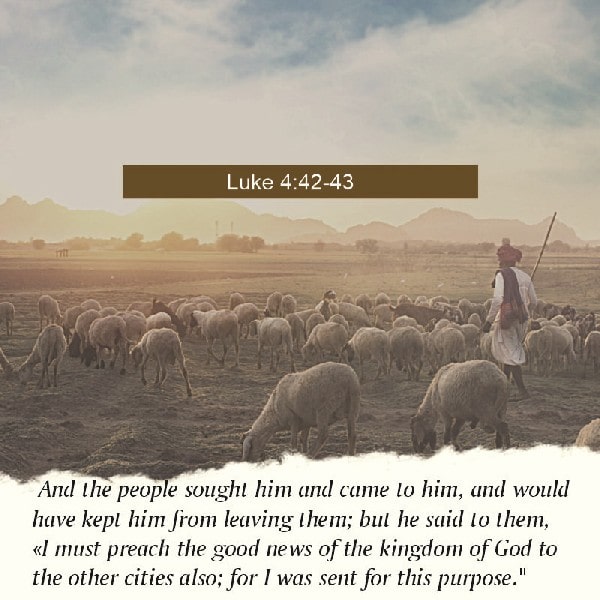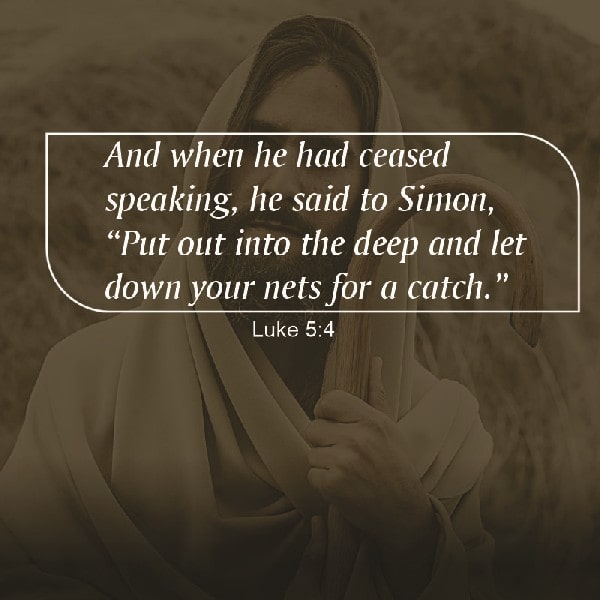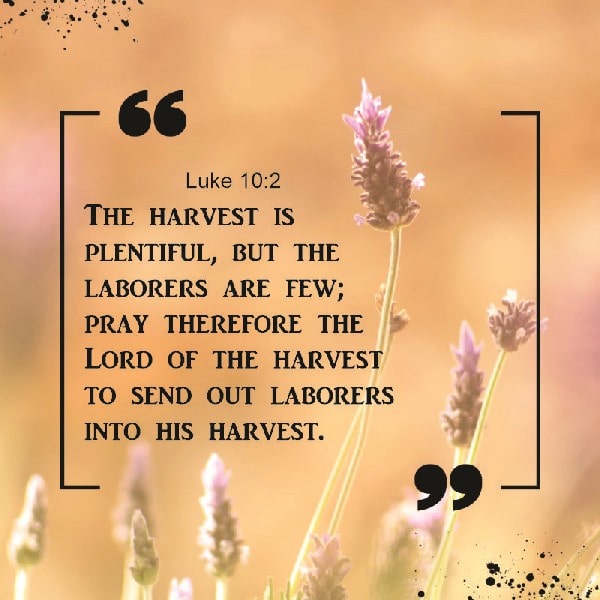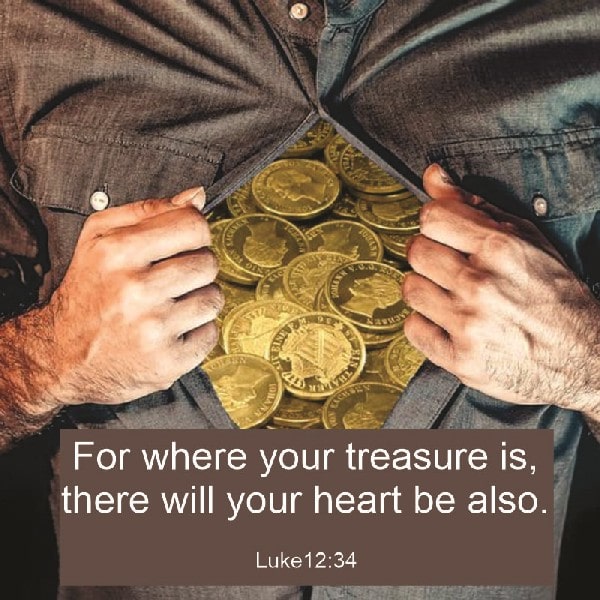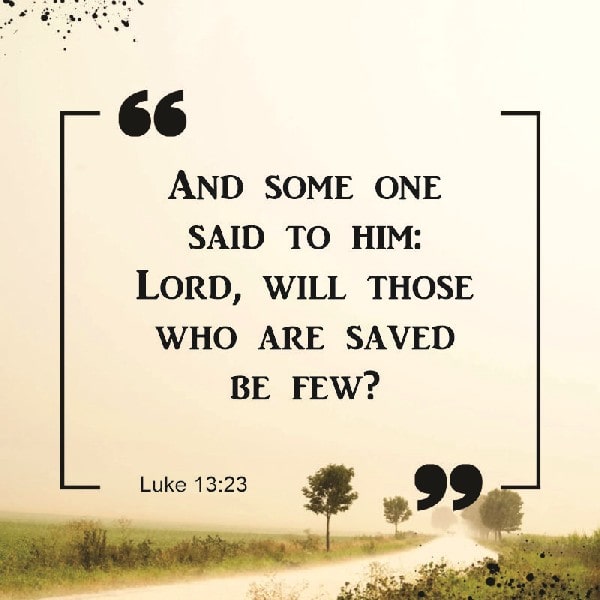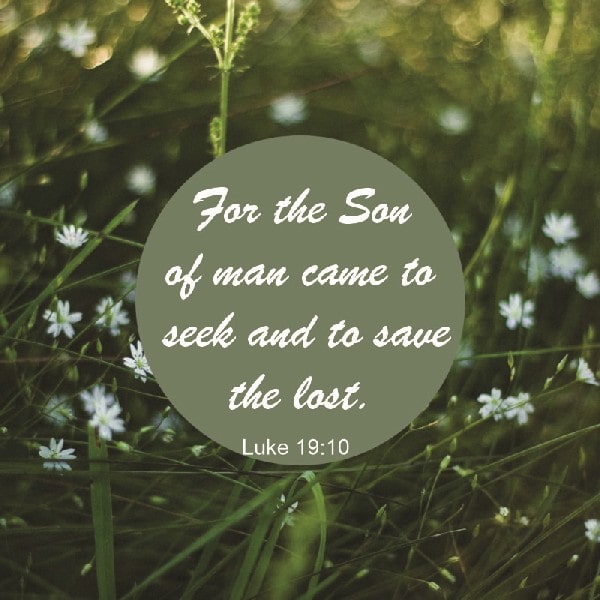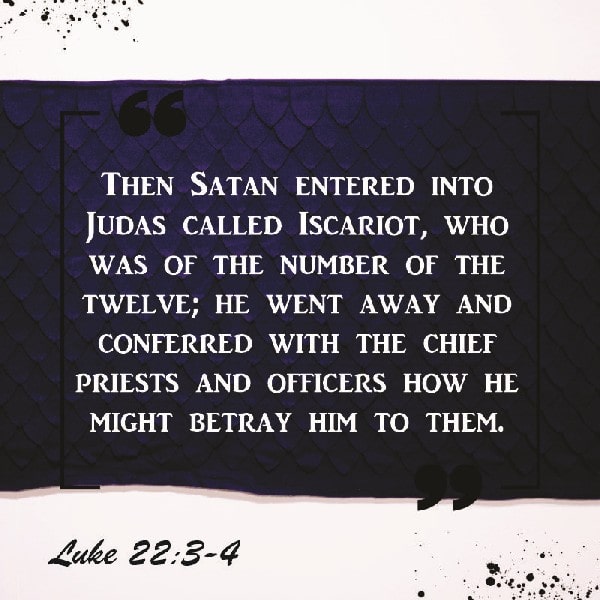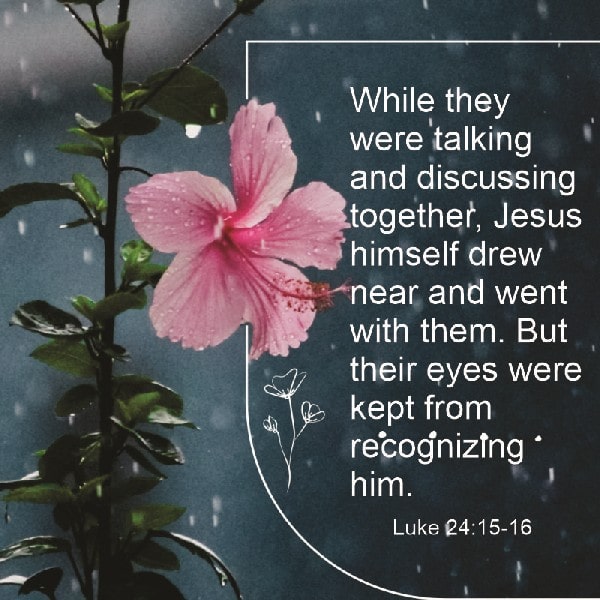Bible study Daily, explanation and encouragement - Luke
Chapter
The prayer to which the angel refers must have been made at an earlier period in Zechariah's life; his difficulty in believing the angel's promise is evidence that he had long since stopped praying for a child, or even waiting for him. But God does not forget about past prayers. What appears to be a delay or a refusal on God's part is only His perfect wisdom and His perfect planning. Some scholars opine that the prayer mentioned here for the coming of the Messiah or for the deliverance of Israel, but this would not be consistent with the context. No doubt Zechariah often prayed for these things, but the prayer mentioned was the one in which he asked for a son.
So do not be discouraged… God is listening to your prayers… sometimes we get sad and think "Lord, but a year has passed and nothing..." and we think of so many whys, where am I going wrong? What is wrong with me? But, stay put! Will happen! At the right time the Lord will arrive with his blessing. Believe.
Luke 1:13

DO NOT GIVE UP! GOD IS LISTENING TO YOUR PRAYERS!
Zacharias and Elizabeth were praying for a child at a time when there were no treatments for fertilization, test tube babies, etc. It was literally ALL GOD.
Verse 6 they BOTH WERE RIGHT BEFORE GOD - Wow! When we read this we were surprised! It indicates both moral and ceremonial righteousness in religious terms. And we wonder why the prayer was not answered?
And it says more: LIVING FLAWLESSLY IN ALL the commandments and precepts of the Lord - means being faithful to all the requirements of God.
Verse 7 - And they had no children because Elizabeth was barren, and they were both advanced in age. Verse 6 makes it clear that God was pleased with the couple. However, those Israelites who knew them would not have imagined this, because childlessness was believed to be a sign of divine disapproval. This lack of children also brought an additional humiliation to the couple: they felt that they could never feel the hope that all Jewish couples felt, that they could be the parents of the Messiah.
But, behold, the angel said: YOUR PRAYER HAS BEEN ANSWERED! This prayer should have been answered a long time ago in Zechariah's life; his difficulty in believing the angel's promise shows that he had long since ceased to pray for a son, or even to hope for him. BUT GOD DOES NOT FORGET THE PAST PRAYERS. WHAT SEEMS TO BE A DELAY OR A REFUSAL ON THE PART OF GOD IS ONLY HIS PERFECT WISDOM AND PERFECT PLANNING. O my beloved brother (sister) do not give up! Do not stop praying! God is listening to you! He will act in your favor! Ask Him for patience to wait for the right moment.
Luke 1:28

This was neither a dream nor a vision, but an authentic visit from an angel. HAIL. This is a joyful greeting. The word in the original is the imperative of a verb that means "rejoice" or "be happy". The form here is a normal greeting. It would be the equivalent of: "May the joy be with you".
FAVORED ONE; BLESSED ARE YOU AMONG WOMEN. The angel honored her for what she would become, even before she knew the subject of the good news. It is true that Mary should be given honor, and the angel set an example for us. But the worship of Mary is completely unjustified. Mary, a mere human being, would be bestowed. Certainly, no greater grace would be shown towards a mortal. She was truly blessed, or "favored one" among women, that is, more than all other women.
Mary's innocent question: How will this be done? She did not say, "It cannot be", but asked for an explanation of how it could be. The Holy Spirit will descend upon you. The angel responded kindly.
LET IT BE TO ME ACCORDING TO YOUR WORD verse 38 - Although she knew that this could mean her death by stoning (Deut. 22:22-23). There has never been a more humble or complete consecration to God. Not even what slanderous tongues could do to her reputation dampened the fervor of her commitment. She gave it to God, just like everything else, and the Lord took care of her as only He could.
That is why when God blesses you it is for you! Do not worry about what others will say. What God has in you and what you live with Him, outsiders do not understand… Go ahead... God is with you!
Luke 1:37-38

Adopt Maria's attitude.
Submit your plans and future to God's will.
Be filled with the light of life so that there is no darkness in you. DEVELOP a personal commitment to the Lord and His will.
Recognize that the usefulness of the Word of God in your life is determined by your receptivity and politeness.
Determine to obey the Word of God. Prefer God's will over your own.
The eye is the lamp of the body. So, if your eye is sound, your whole body will be full of light; but if your eye is not sound, your whole body will be full of darkness. If then the light in you is darkness, how great is the darkness! Matthew 6:22,23.
Luke 1:38

No other being was closer to Jesus on earth than His mother, Mary. As a mother, she is just like any of us, but she was more blessed than any other woman to be the mother of our Lord.
The frightening idea of giving up her virgin body as an instrument for the operation of the Holy Spirit could well be misunderstood, but Mary's unstinting trust pleased the heart of God.
Jesus always responded lovingly to His mother's concerns and, before dying, He made a last gesture of tenderness when He left her in the care of John (John 19:25-27). In life, it sometimes happens that children follow paths that do not allow them to be with their parents in old age, when illnesses and fragile times arrive, and other children do not really want to have to take care of their parents. Jesus did not leave Mary in the care of some younger brother, He handed her over to John, who represents the fraternity of the church here. Jesus once said that his true family are those who do God's will. It is annoying when children cannot or do not want to give attention and care, but God, who is good, raises other brothers and sisters in Christ who will be like sons and daughters in caring.
Luke 2:12

The circumstances of the Jesus' birth were very humble, and bore every possible mark of contempt. He was indeed a first-born son, but it was a small honor to be the first-born of a poor woman like Mary, who had no inheritance to which He had a right as the first-born.
He was wrapped in swaddling clothes, as were the other children. The Ancient of Days became a child, and lived his life on earth.
He was born in a stable. This son of David, who was the glory of his Father's house, had no inheritance to draw upon, not even in the city of David, nor a friend who could entertain his afflicted mother, with lodgings where she might rest. Jesus was born in a stable, to indicate that He came into the world only to reside temporarily, and to teach us to do the same.
He was laid in a manger; the place where cattle are fed. For there was no room in the inn, and for want of lodging. This shows the poverty of his parents. If they had been rich, there would have been room for them; but as they were poor, they had to make do as best they could. If there had been any humanitarian feeling among the people there, they would not have taken a woman in travail to a stable.
Jesus thus despises all the glory of this world, and teaches us to do the same. Since His own did not receive Him, let us not wonder that they do not receive us.
When we see Him wrapped in swaddling clothes and lying in a manger, we are tempted to say, "Surely this cannot be the Son of God." But seeing His birth attended by a choir of angels, we may say, "Surely this cannot be other than the Son of God".
WHEN NOT TO SPEAK - Some very serious things were happening in Maria's life.
Mary must have thought of Joseph, the man to whom she was betrothed. She must have wondered how she was going to break this news to him and how he would react. She must have wondered if her parents and friends would believe her story.
Then time passed and the birth took place. The angels appeared to the shepherds and told them to go to the stable and worship the child Christ. These are the things Maria did not talk about. She kept them in her heart and reflected on them, according to Luke 2:19.
Whatever Mary thought or felt, she controlled herself, because she said to the angel who brought her the news, "let it be to me according to thy word" (Luke 1:38).
I believe when God says something to us, we often need to keep it to ourselves. He gives us the faith to believe what he has told us, but if we try to tell others that, they might think we went crazy.
And many times we have to be like Mary, keep in faith what God speaks to us in our hearts. And do not go out talking to everyone out there. When it happens, there is no doubt that everyone is seeing it. The silent wait is for us.
Luke 2:19
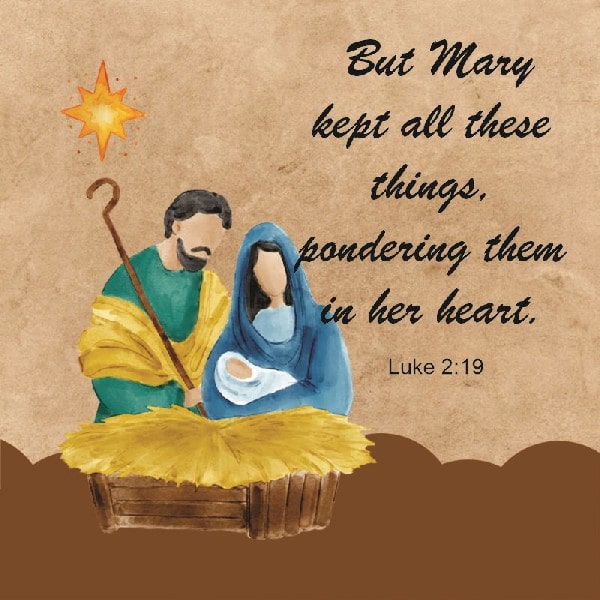
Whatever Mary thought or felt, she controlled it, because she said to the angel who brought her the news, "let it be to me according to your word" Luke 1:38.
When God tells us something, we often need to keep it to ourselves. He gives us the faith to believe what He has told us, but if we try to tell others that, they might think we have gone crazy.
This is one of the problems with sharing too much with others; we are discouraged instead of encouraged. Other people do not always have the faith to believe what God has told us.
Have you ever thought about Maria going door to door knocking and telling everyone everything the angel told her? MARIA KNEW HOW TO KEEP HER MOUTH SHUT AND HER HEART OPEN. I encourage you to do the same!
Jesus began his ministry he wasted no time, his life was very busy, his involvement in the Father's work was so much and so deep that time was short. We already read in the gospels in several verses that the crowds following him in verse 43 tells us clearly that they were looking for him. Jesus is all good! Whoever finds Jesus, finds a treasure, finds love, the solution, life! The crowds begged him not to leave them!
At that time, medicine was not like today, whennow we have medicines to treat epilepsy, for example, so imagine that people who suffered from certain diseases as well as the woman with the flow of blood were cured, completely freed from their evil... fall in love with Jesus and never leave him? How could I not beg that man so full of love and compassion and words of life not to leave them?
In Matthew 5:18 the young Gadarene with whom Jesus cast out the demons that had possessed him for years, PURSUED JESUS TO LET HIM GO WITH HIM. Jesus did not allow it, but said, “Go home to your family AND ANNOUNCE how much the Lord has done for you and how he has had mercy on you.
So are we, we need to walk in faith. What Jesus did for you and me is extremely important, joy, but we cannot stop here is just receiving the blessings, we need to be partners with Jesus in this work of announcing the good news, to family, neighbors, friends , and everyone who crosses our path. Jesus could not stop and just stay there taking care of a group, he needed to go to other cities and just like he did not stop, we cannot stop! You say, "But I do not know how to preach!" But you know how to say that Jesus is good and what He has done in your own life! Speak up, do not shut up! You have leveled up, you are no longer among those blinded by the enemy, you and I are now bringers of good news!
Jesus was instructing experienced fishermen, but his authority and knowledge were based on his divinity, not experience as in the case of a fisherman. HE HAD A SUPERHUMAN KNOWLEDGE OF WHERE THE FISH WERE. Jesus' advice to go out to sea suggests that these fishermen were fishing in shallow waters. It was a type of fishing where one end of the net was stuck on the shore and the other end on the boat. And the fishermen would row in a semicircle, starting and ending at the shore, keeping the net taut between the boat and the shore. The words GO DEEPER have an obvious spiritual meaning.
GO DEEPER! With Jesus guiding our lives, everything works out. With Jesus at the helm, we can risk going deeper, daring and achieving the desired success. If Jesus is in charge, do not be afraid, go!
Reason says: It cannot - As Peter said: “master, having worked all night… but because you say so” The fisherman's experience told him that it would be useless to try again now. You know, sometimes your previous relationships all went wrong and you say, "No more, I closed my heart to love." Try again, this time under Jesus' guidance. Jesus' command makes the difference, Peter understood that. Faith said that if Jesus commanded or demanded action, it would succeed. So we see that faith breeds obedience. With faith, you no longer make choices in your own head, but under obedience to Christ's will and direction.
Luke 5:32

When people receive Jesus Christ as their Savior, they need to surrender to Him not only what they are, but especially what they are not. We try to impress God and other people with what we are while hiding what we are not. I do not think people can become everything God wants them to be until they face what they are not, and do not have a problem with that anymore.
We all have weaknesses and incapacities. Satan would like you to think that he is the only person who has the problem or weakness that you do, but that is just not true. If we were all perfect, it would not be necessary for Jesus to come to earth. According to Luke 5:31, he came to those who were sick (needy) and not to those who were healthy (not in need).
2 Corinthians 12:7-10 shows that the apostle Paul understood this and proceeded to glory more gladly in weaknesses. The power of God is made perfect in our weaknesses. Whatever we are not, He is, and He does it for us.
Luke shows Jesus in prayer before any big event in His life. The choice of the 12 was so important that Jesus not only prayed, but He spent the night in prayer to God. The Master has given us an important example to follow. We must never make any major decision without a season of sincere prayers.
When it was day, He called his disciples to Him (v.13). A disciple is a student, an apprentice, a follower. All of Jesus' followers were disciples. Having concluded His night of prayer, He was now ready to choose the leaders of His kingdom.
As disciples, let us learn from our Master and practice prayer first and foremost.
- Jesus interrupted a funeral procession outside the city of Nain. There is a peculiar sadness in this description, "the only son of a widow" (Luke 7:12). No family accompanied the lonely woman, who was burying her only child. As the crowd watched, Jesus approached the bier, ignoring the formalities and ceremonies and even defiling Himself by coming into contact with a dead body.
- The verb translated "compassionate" is related to the bowels of the body, which was supposed to be the seat of emotions. Jesus had an emotional reaction to that scene. He looked at the woman and said, "Do not cry."
- To the young man he said - "Young man, I command you: arise". Before many witnesses, Jesus once again reaffirmed His power over sin and death.
- Although that mother's reaction is not recorded, she certainly also glorified God, along with her neighbors, for she had learned the validity of the Messiah's statement, "I am the resurrection and the life" (John 11:25).
Luke 7:50

- The woman in Luke 7:37 was someone who had a past. She sold her love by the hour; she was a prostitute. The Pharisees called her a "sinner". Through her we have the example that God does not always call people from a wonderful past to serve Him. God calls from a negative past to a powerful and blessed future. Just because you did not get a good start in life does not mean you cannot have a great ending.
When we have an unpleasant past, people often misjudge our actions. This leaves us stuck in the approval game, where we try to convince others that we are acceptable. People do not forget our past as easily as God does. The Pharisees could not understand why Jesus allowed the woman to even touch Him. But Jesus answered them saying that those to whom much has been forgiven love much. - In the end, she wanted to give Jesus the best she had; she wanted to serve Him. And He saw her heart and not her past. That is what He sees in you too.
Luke informs us that some women played a vital role in Jesus' evangelizing ministry. Each of them had a special reason to be very grateful to Christ, and to feel indebted to Him. They had been healed of evil spirits and diseases.
In verse two it speaks of Maria Magdalena, it means Mary, from the city of Magdala. She is described as a woman from whom seven demons came out. It is commonly believed that she had been a prostitute who had repented and become a holy disciple of Jesus. It is usually represented in this way by painters and by some ancient historians. But there is not the slightest bit of evidence, either here or anywhere else in the New Testament, that she was an immoral woman.
Joanna, wife of Cuza, procurator of Herod. The Herod mentioned here is Herod Antipas, governor of Galilee. The Bible does not say of what Joana was cured. Her position shows that prominent people were also led to Christ. Nothing is known about Suzana other than her name. But there were many others but only three names are mentioned - no doubt because of their importance, there were possibly other high-class women.
Often we do not know how to preach, or sing, but that is not why we stop serving Jesus in some way, we can help with our offerings, with church work, cleaning, ornamentation, or staying with the kids so the parents can watch the services is much more.. think today how you can better serve Jesus. Do not stop!
Luke 8:18

He who has, as the result of right hearing and acknowledgment of obligation, will be entrusted with more. The sluggard and the spiritual imposter will never possess true riches, but even what they seem to have will be taken from them. Sometimes it is difficult for the spectator to distinguish the difference between the real and the apparent, but God knows the difference and deals with men in the best possible way.
Luke 8:50

LISTENING TO JESUS AND KEEPING FAITH
Jairus' daughter, who was one of the synagogue leaders, his only daughter who was very sick and went to look for Jesus her healing. As they was on their way to Jairo's house, someone came to inform them that the girl had died. You no longer needed to bother Jesus. We are often in this situation, praying, fasting and seeking God's help, but the outside voices want to kill our faith saying, "There is no way". "Already dead". "It is the end". It is so disheartening when we are looking and asking for a goal and people come to you and say we are just not going to make it. LISTEN TO JESUS- He has a word of encouragement that sustains a weak faith. DO NOT FEAR; Do not be scared, do not be scared!
BELIEVE ONLY! AND IT WILL BE SAVED. Cling to Jesus, stand firm in the word and what the Lord says. Do not give credit to opposing voices.
NOT DEAD, BUT SLEEPING - (verse 52) A word of revelation that softens the severity of death. By people's faith in Jesus I have seen definite situations turn back. Broken marriages have already signed the divorce and Jesus make a twist and change everything. It is much more, this is just a small example.
CHILD ARISE! A word of power that brings it back to life. In that text, it says that people even laughed at Jesus when he said that the girl was not dead and was just sleeping. They will laugh at you too, ridicule you often, do not get carried away. Stand firm with Jesus, He alone has a word of power that brings back to life what is dead.
In Matthew 8:19 the same account is written, however, Matthew says that this "someone" was a scribe - teacher of the Law - who approached Jesus with an offer that sounded like a complete consecration: MASTER, I WILL FOLLOW YOU WHEREVER YOU GO. But Christ put this possible disciple to the test, reminding him that foxes have civilians and birds have nests, but the Son of man has nowhere to lay His head. In other words, He said, "Think about the cost of that decision."
An artificial compromise is easily established, but behind it there is often a selfish motive. Here Jesus makes it clear that anyone who wants to follow Him for earthly gain would be disappointed.
Today, here in Brazil, because of the large number of evangelicals, being a Christian is almost a rage. And there are interests that are not just repenting of sins, changing their lives and following Christ spreading the gospel. Unfortunately… there are also many preachings that only indicate success and blessing if you follow Christ. That is why it is so necessary for us to study the Bible for ourselves, seek biblical commentaries and sources of information so as not to be deceived by false preaching. Following Christ has demands, sacrifices and struggles. Be aware of this.
Luke 9:62

- Another person also wanted to follow Jesus, but wanted to say goodbye to his family. This man voluntarily offered his services to the Master, but wanted to postpone religious services in order to fulfill social obligations first. Jesus is saying here as in the two preceding passages, that serving Christ and His Kingdom must come first. If we do not put Him above everything else, no matter how important other things are, we cannot be His disciples. Once we have cast our hands to the plow in the Master's field, we cannot look back. Jesus seems to suggest that this willing disciple is still looking hard at the things he is leaving behind.
- Jesus knew and knows when a commitment is heartfelt or not, and He just does not want divided-hearted disciples. Your work and person are too important to have superficial disciples.
- The harvest metaphor seems to have been one of Jesus' favorites. The harvest of human souls has always been great and the workers have always been, tragically, few. It is man's lack of interest in his fellows that keeps this number so small. But the Master makes it clear through His Gospel that this interest is a test of discipleship. His disciples are working in the field. Those who are not working do not deserve to be called disciples.
- Pray, therefore, to the Lord of the harvest to send workers to His harvest. Bringing the harvest to the barn is our responsibility. And getting needed workers is partly our responsibility. We should look to the needs and beg the Lord to send additional workers, but no man has a right to pray for help in the harvest until he is doing his best. God will not send workers to help a sluggard. He does not need help to do what he is doing, namely, nothing.
Luke 10:3

- What a paradox: Lambs going out to save sheep from wolves! Here is simplicity coupled with helplessness: no carnal weapons as a defense. But God has a way of creating strength out of weakness, and of using even death as a weapon of victory and life. Here we see the supremacy of Christ. He is the greatest victor in the world, and yet His strength has not been used in the matter of carnal or earthly defense. Christians have been murdered by the thousands, but the triumphant advance continues. At this point, we have to stop and meditate and gain new light and inspiration for the task and struggle of the present day. We are not unprotected, for Christ is with us. Since death itself does not overcome us, we can begin to understand that we are unbeatable. But if we begin to equip ourselves with carnal weapons, we are heading towards defeat.
Luke 10:19

- This scripture does have a literal implication, but the context seems to demand that the main meaning be spiritual. Notice how Jesus makes an analogy between serpents, scorpions, and all the strength of the enemy. Both the earlier and later verses refer to satanic forces. The symbolism is common to satanic forces and demons and even to Satan himself. The main meaning is that Christians are empowered to tread triumphantly over the armies of Satan, through the help and grace of Jesus Christ.
Luke 10:29
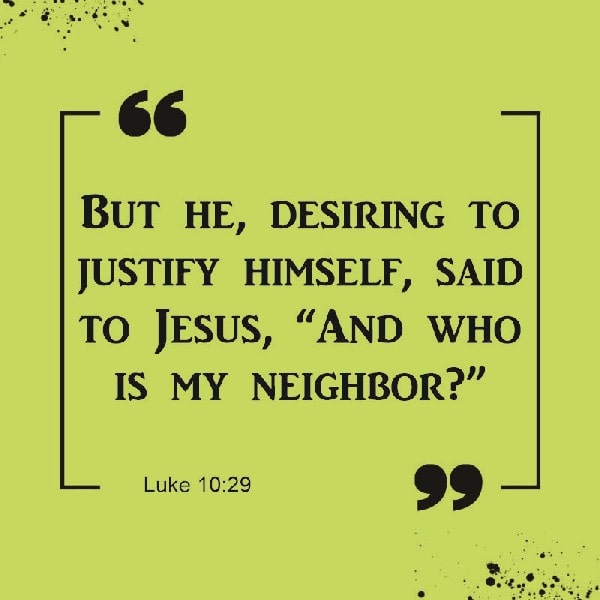
This story begins in verse 25 of Luke chapter 10 when a scribe stands in a synagogue where Jesus is teaching and asks, "Teacher, what must I do to inherit eternal life?" Jesus understands that it is not an honest question from someone who really wants to learn, but a malicious question from someone who just wanted to get Him involved in a religious issue. Then Jesus replied, "What does the law of Moses say?" And "what do you understand?"
Then the scribe replies, "Love the Lord your God with all your soul... and your neighbor as yourself." Jesus says, he is right.
But the scribe to justify his actions still asks: "AND WHO IS MY NEIGHBOR?" To which Jesus proceeds to tell the parable of the good Samaritan.
A parable says that a man was going down from Jerusalem to Jericho and fell into the hand of robbers. They stole robbed the man ans also wounded and leaving him almsost dead and thrown him on the side of the road. Jesus says that a priest and a Levite passed through there, but they passed from afar, we do not know the reasons that led to not helping the man but the emphasis is the same: What matters is what they lacked, not why they did not act. They were almost devoid of love for their neighbor.
The third who passed was a Samaritan, his name and social status are of no importance, for all Samaritans were hated by the Jews and the Samaritans also had a similar feeling for the Jews. The point is that a man who had no special reason to help this Jew and a lot of racial motivation not to help him was moved with compassion for a human being who was suffering.
Lessons for us:
- We must help a person even if he caused his own problem.
- Any person from any nation who is in need is our neighbor.
- Our help has to be practical, and cannot just consist of feeling sorry.
Luke 10:40-41

- Are you too busy? It seems that nowadays everyone is. Martha was also busy. She was too busy to take the time to enjoy Jesus' presence when He came to her home. She was busy working and trying to impress Jesus and everyone else. She wanted everything to be right, and everything was right - except her motivations.
- Mary, on the other hand, seized the opportunity to sit at Jesus' feet and learn. She knew the work would always be there, but Jesus was not. We need to spend regular quality time with God. Do not make the mistake of trying to fit it into your schedule, but make the decision to put it first.
True prayer is born of the spirit, a divine connection with the Father!
It is a holy summons, it is time for the church of Jesus Christ to wake up. Reaching for heaven and bringing heavenly resources to earth!
Prayer must be a way of life! We need to stay in the cloud of Glory!
There are divine resources available to you! GOD HAS HELP AND VICTORY FOR YOU!
Luke 11:1
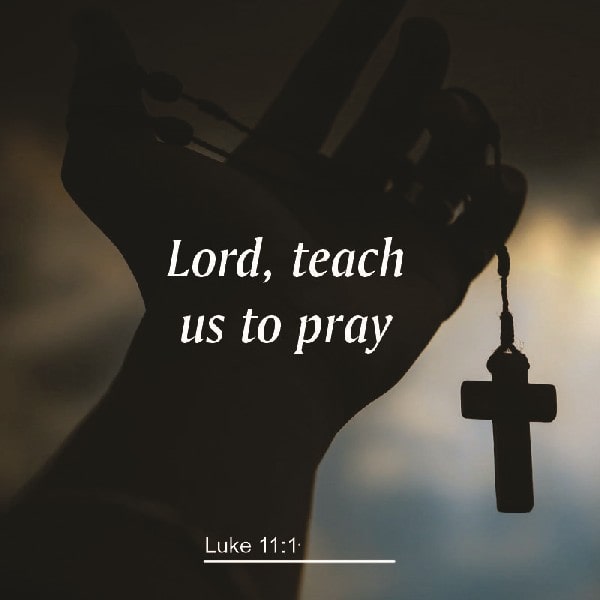
The best way to learn to pray is to reach out to the great intercessor who lives forever and intercedes for us!
Prayer itself is an art that only the Holy Spirit can teach us. He is the giver of all prayer - Charles Spurgeon
The Holy Spirit is our teacher and also our divine enabler. The One who makes it possible for us to offer prayers that are divinely motivated, directed, and empowered by Him!
Jesus lived in unbroken communication and friendship with the Father. Before all important events He spent alone with the Father. John 5:19
Prayer is the key that unlocks all the deposits of God's infinite grace and power - R.A Torrey.
Luke 11:1
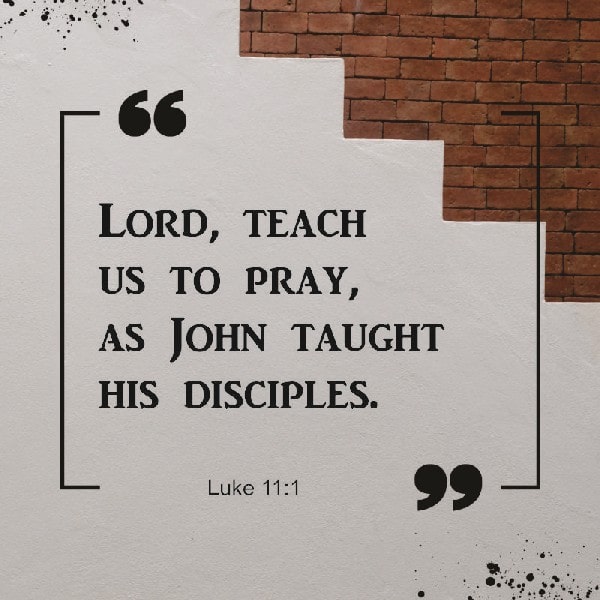
In verse 1 it says that Jesus was praying in a certain place. When he had finished, one of his disciples said to him: Lord, teach us to pray. He was very moved by Jesus' prayer, it was very different from the prayers he heard in the synagogue and temple. Perhaps it was the personal intimacy or simple faith that moved him. A prayer such as Jesus offered could not fail to thrill any truly pious soul.
This disciple must have been a former disciple of John. Although John's prayers were far superior to the average person, he saw and heard something in Jesus' prayer that marked a breakthrough in what his soul wanted to follow.
- Christ praying, teaches us to pray as a rest after work.
- Christ, praying, teaches us to pray as a preparation for important steps.
- Christ, praying, teaches us that prayer is the condition for receiving the Spirit and the glorious presence of God.
Synagogues refer to lower ecclesiastical courts; magistrates are literally rulers, Jewish authorities of the highest rank; powers or authorities probably refer to such rulers as Herod and Felix.
Do not worry about what you will say. They did not need to prepare speeches and have them ready in case they were arrested by the authorities. They should leave such matters to the future and to God. In the meantime, they should focus their attention on faithfully carrying out the work of spreading the good news of the Kingdom.
IN THE SAME HOUR THE HOLY SPIRIT SHALL TEACH YOU WHAT YOU SHALL SAY. Carrying the burden of thinking about what to say in case of arrest would be wrong because it would interfere with the work of preaching Christ; it would also be worse than wasting time. The Holy Spirit can furnish better testimonies and arguments, and He would furnish them immediately and the instant they were needed.
Luke 12:15
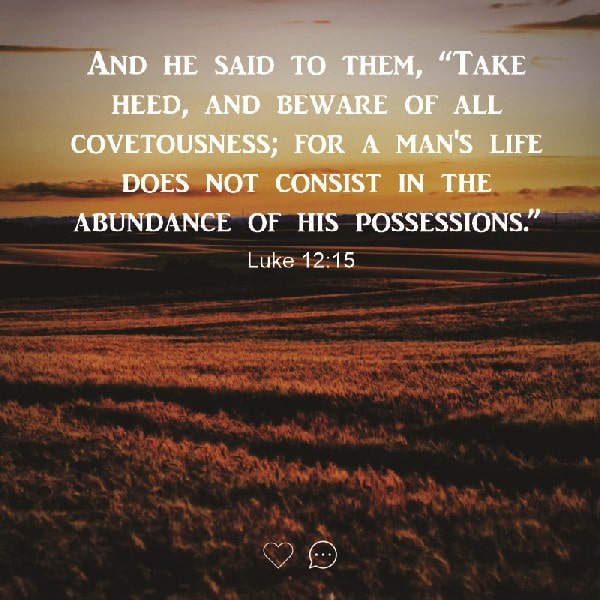
Beware and guard against avarice, because a man's life does not consist in the abundance of what he has. - The things one possesses do not produce a rich and complete life, nor do they bring happiness. When we study the lives of those who lived richly and usefully, it is striking to see how little importance was given to the things they possessed. The abundance of things more often produces anxiety and discontent than happiness. Often those who own most of the world's possessions have never known the thrill of lasting achievement. What counts in life is God first, and then spiritual treasures like love, joy, peace, a clear conscience, a sense of accomplishment, a sense of mission, and the hope of reaching Heaven.
This is more than a prediction. It is the declaration of a universal principle. Whoever we are, whatever our conditions of life, whether we are saints or sinners, our hearts are where our treasures are. Therefore, if we love God, we will lay up our treasures in Heaven, using both our talents and our possessions for the glory of God. Thus, as we gather more and more treasures on the other side, our interest in Heaven and divine things will increase, and our hearts will be more firmly attached to the divine world.
This verse is a measure by which we can determine the depth of our devotion. It can also serve as a warning. Any time we find ourselves becoming more interested in earthly goods than in divine treasures, the time has come for a serious soul-searching; it will be time for a transfer of deposits from the earthly bank to the divine bank.
Luke 12:35-36

In another translation it says: Let your loins be girded. Long oriental robes could impede both walking and work unless they were tied above the waist to give freedom of movement to the feet and legs. The belt therefore served a practical purpose. The servant thus girded was ready for immediate action, like the Christian who has removed all obstacles to serving God, and receiving his favors.
And your lamps lit... The lamp used in ancient Palestine was very simple. It was a small pitcher-shaped bowl with a wick. The wick had to be adjusted and the lamp filled with oil to obtain light. The Christian must never neglect his light; he must not allow his wick to be scorched or his oil to run out. Personal devotion - prayer and Bible reading and faithful service will keep the soul lamp burning brightly.
Be ye like men who wait for their Lord to return from the wedding feast. With their robes tied and their lamps burning bright, these servants await the return of their Lord from the wedding. They are not sleeping, they are watching, and faithful servants never sleep in service.
Luke 12:49a, 51
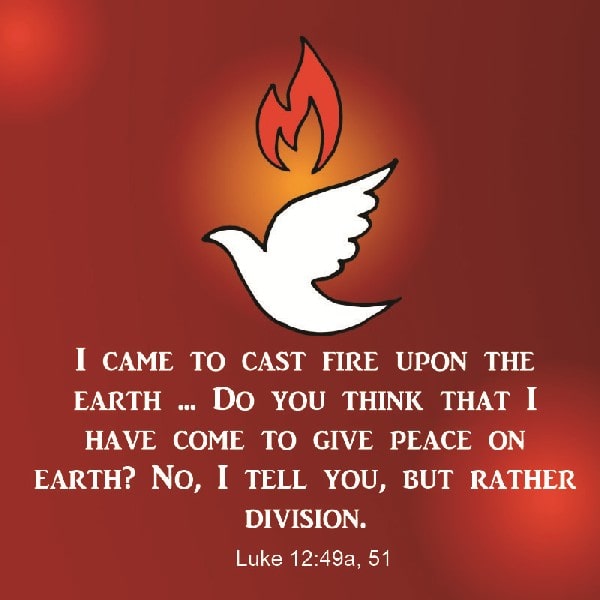
Jesus in His preaching goes on to say that His coming to earth was not designed to smooth the way for the enjoyment of this world's well-being. On the contrary, His coming would inevitably bring division and conflict. How could it be otherwise? Egoistic, sinful men would not naturally and willingly submit to an unselfish, self-sacrificing lifestyle such as is represented by Christ.
Jesus is making it clear to His disciples and to those who hoped to become disciples that if their motives for following Him are selfish, they will be disappointed. He has no material wealth, power, fame, or convenience to offer. But if you are willing to follow Him out of pure love, selfless love, He has spiritual and eternal rewards that far exceed the costs of discipleship.
We must not, however, ignore the fact that the end result of conflict - or fire - is good. It will be the victory of Christ and His Kingdom. Only evil will be destroyed. Fire has a purifying effect, even if it is the fire of conflict.
We do not know what provoked this question, nor do we know the attitude or personality of the inquirer. Perhaps this question is a reflection of the prevailing Jewish exclusivism - Jews as the few who would be saved. Whatever the reason for the question, the Master gave a serious and objective answer.
STRIVE TO ENTER IN THROUGH THE NARROW DOOR - The Greek word here translated to strive is "agonize." The word narrow denotes tightness. With a narrow door restricting entry, forcing one who enters to throw off any weight or baggage, and with opposing forces blocking his entry, people must ardently strive (agonize) to enter. The passage as a whole is saying, "whatever the obstacles, you must enter because the price of failure is too high." MANY WILL SEEK TO ENTER (when it is too late) AND WILL NOT BE ABLE. This is a reference to the second coming of Christ, the end of the age of grace, or death as the end of the period of probation.
AND YOU BEGIN TO BE OUTSIDE AND KNOCK AT THE DOOR- Verse 25 - Two sins are probably responsible for the arrival of the late ones: rebelliousness and presumption. Love of sin would hold them back, and a false hope that the Master's love and kindness would lead him to make an exception for them, would prevent them from acting according to a good conscience.
THEN YOU WILL BEGIN TO SAY: WE HAVE EAT AND DRINK IN YOUR PRESENCE, AND YOU HAVE TEACHED IN OUR STREETS - The superficial knowledge resulting from eating at the Master's table was something very different from "knowing" the Master or being known by Him.
The humble attitude not only avoids the risk of humiliation, but is always the path to exaltation. If someone positions himself in an inferior place, he is likely to be promoted - if he has any merit. This promotion will bring an honor superior to the honor intrinsic to the place given to him. But action should be taken, not because it works - it brings honor - but because it is right. The best way to stay sincerely humble is to keep your eyes on Jesus. If this is done, the true merit of the master will by far overshadow any unimportant merit that anyone may feel belongs to him, and the natural result will be genuine humility.
Luke 14:22

The banquet hall still had many empty seats. We see here that the size of the Kingdom is vast, we see the boundless opportunity for all who have due regard for the invitation of the master of the house.
AND INSIST ON EVERYONE - In the literal setting of the parable, this simply indicates that the latter were pressured to accept the invitation, THAT MY HOUSE MAY BE FULL. In a spiritual application we see the Evangelistic zeal of the church, as well as the Holy Spirit's convincing pressure regarding sin that "pulled" millions of Gentiles into the Kingdom. This is not to say or justify the mass autocratic conversion and force - of entire tribes or nations by ancient and medieval kings. This pressure must be that of love, logic, and the drawing power of the Holy Spirit. Let's get out of the churches and take the word to everyone we meet on our way. Our job is to announce, conviction is the work of the Holy Spirit, so that the house (Kingdom) of God may be filled. There is still room, but the time is approaching that the house is full and the Rapture of the Church will take place.
Luke 14:26-27
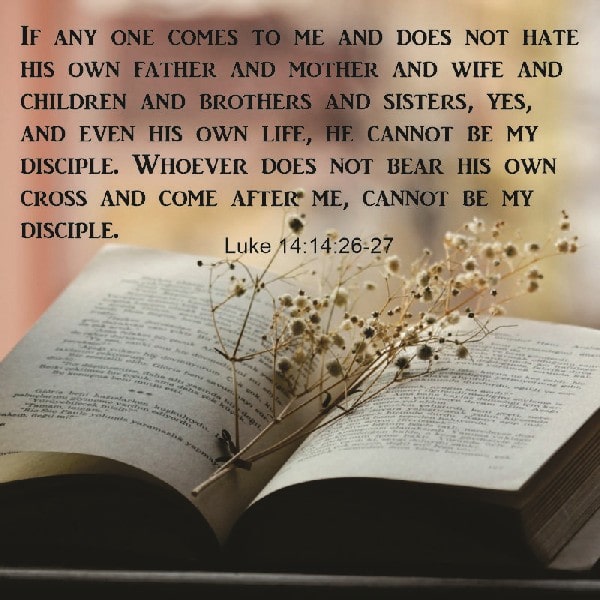
The text says that a multitude followed Jesus. Among this multitude of people were the true disciples, as well as selfish parasites interested in whatever advantage He could bring them, and enemies eager to destroy Him.
Jesus recognized the threefold division of the multitude. He further clarified the requirements of discipleship and undoubtedly further restricted the group of sincere disciples. Of course, He did not literally mean that we should hate our family members. This would be completely out of harmony with his teachings in other passages. He is using this strong language to say that He cannot allow any other love, obligation or relationship to come between the master and his disciple. Anything that comes between man and God separates his relationship with the Lord. EITHER CHRIST HAS FIRST PLACE IN OUR LIVES, OR HE HAS NO PLACE IN OUR HEARTS.
In Luke 15:1-7 Jesus tells the parable of the lost sheep. Where the shepherd leaves the ninety-nine and goes in search of the lost one. Today in Brazil the number of evangelicals has grown a lot. We have people declaring themselves evangelical from all strata of society. We see crowded churches and also for all tastes. We also observe a number that is interesting, which is the 'ex-evangelicals' … and we see that when people leave the church or stop going for some reason, no one goes after or seeks to know why that person no longer goes, what is the problem … just let it go. After all, there are many others in the church and it is as if it was not needed.
But when reading this parable we see that this is not the right thing to do, the shepherd left the 99 and went in search of the lost one. HE WENT IN SEARCH. The sheep may have been injured, it could not even come back on its own and the shepherd HAPPILY LAY IT ON HIS SHOULDERS. He loaded that sheep with all its troubles and took it back home. It is this love and care of God-filled people that marks many lives, the love and care that was not given out there is given by the servants of the Lord. Let us be more careful and care more about those who stray. For there will be more joy in heaven over one sinner who repents than over ninety-nine righteous persons who need not repent.
Luke 15:23-24

It is said of a young man who left home to see the world. It left a longing in the parents' hearts. Since he left, he never bothered to keep in contact. He had crossed out his family name. Selfishness and illusion dazzled his eyes. Until disappointment and financial difficulty knocked on his door. His friends had gone. Employment was difficult to find. And he could not pay his commitments. How long would that situation last? He could not predict.
It was then that he remembered his parents. Were they still alive? It had been so long ... He decided to write a letter in the following terms: “Dear parents, I ask your forgiveness for my behavior. I want to go home, but I need proof that you accept me. When the 12 o'clock train passes the curve where your house is, if you will accept me, put a white handkerchief spread over the orange tree. Otherwise, I will know that I do not deserve your love and will not come down at the station. On the agreed day, his heart was pounding, and he told his fellow traveler his story. He asked him to look at the orange tree on the curve, if there was any handkerchief extended.
"There is no scarf!" he told him. "But dozens of handkerchiefs covering every orange tree!"
It was a great party, as in the story told by Jesus. There is also a party for you prepared in Heaven. Come back today! The Father misses you.
The continuation of the text says: But if they are dishonest in small things, they will also be dishonest in bigger things. And if you cannot be trusted in dealing with the unfair wealth of this world, who will trust you with true wealth? And if you are not faithful with the goods of others, why would anyone trust you with what is yours?
This is a universal truth. Fidelity and infidelity are not mathematical questions. They arise from the moral and spiritual condition of the inner man. Thus, a man's faithfulness or unfaithfulness in minor matters is an indicator of his character. Based on this indicator one can determine whether it can be trusted on matters of greater importance.
The truth is that in this life we have nothing; God owns everything and we are his stewards. Implicit in this verse is the promise that in the world to come we will receive our own wealth. But if we are unfaithful in our present condition as stewards of wealth, God will not entrust us with our own wealth - He will not give us the true wealth of the next world.
Luke 16:26

- This verse is part of the story of the rich man and Lazarus found in chapter 16:19-31.
God has placed a chasm between heaven and hell that no man can cross. This life is the time for repentance; this world is the place where the soul is prepared for eternity. Beyond that line that demarcates death, no man can change his spiritual state, or place where he will eternally dwell. - And I said to him therefore, father, that you would send him to my father's house, for I have 5 brothers… (verses 27,28). When the request for help was refused, the man asked that Lazarus be sent to earth, as a missionary, to his five brothers. However, this missionary spirit, this interest in the salvation of his family, should have come sooner - when he was still with them.
- They have Moses and the prophets (verse 29). They have the means by which the Lord God planned and determined salvation, and anyone with a submissive heart can find the way. God accepts those who serve Him because they now hate sin, just as God hates sin. They want God for who He is, not for what He can do to avert an eternal catastrophe in their lives. The way and means by which the Lord God planned and determined salvation are wholly sufficient for all whose motives are right; and there is no other way of salvation(then through the Lord Jesus Christ).
Luke 16:26

- This is the parable of the rich man and Lazarus (Luke 16:19-31). In short, the rich man lived luxuriously while poor Lazarus begged at the rich man's door and the dogs themselves came to lick his wounds, until both died. The beggar was taken to Abraham's bosom (paradise) and the rich man went to Hades (hell).
- AND IN HADES HE RAISED HIS EYES, BEING IN TORMENTS - There was no sleep of the soul there, no intermediate state. He died, and was immediately in hell, while Lazarus was immediately taken to paradise by the angels. The word Hades is a broad term, equivalent to "the land of departing spirits" or "the world to come". Therefore it does not always refer to a place of punishment. But in this parable, it was a place of punishment; THE RICH OPENED HIS EYES IN TORMENT. Note that the word is in the plural. Fire was just one of the many causes of suffering for lost man. There was memory, consciousness, reasoning, the ability to see the blissful place of Lazarus, and much more.
- For the first time, the man realizes that he is desperately in need of help, and that it is far away. On earth, he had every comfort possible and now he wants Lazarus to bring a drop of water to wet his tongue.
- A GREAT GAP BETWEEN US - God has placed a chasm between heaven and hell that no man can cross. THIS LIFE IS THE TIME FOR REPENTANCE; this world is the place where the soul is prepared for eternity. Beyond that line which marks death, no man can change his spiritual state, or his eternal abode.
- Having his request refused, the man asks that Lazarus be sent to earth as a missionary to his five brothers. But this missionary spirit, this concern for the salvation of his family, should have come earlier, when he was with them.
- IF ANY OF THE DEAD WERE TO COME TO THEM THEY WOULD REPENT - God does not propose to accept those who turn to Him only out of fear of hell. A completely selfish desire to escape hell and enjoy heaven is no reason for salvation. God accepts those who serve Him because they now hate sin, just as God hates sin.
- They want God for who He is, rather than simply wanting Him for what He can do to avoid eternal catastrophe in their lives. The way and means by which the Lord God has planned and determined salvation is wholly sufficient for all whose motives are right; and there is no other way of salvation.
The Master's inflexible teaching regarding offenses frightened and depressed the apostles. They did not feel up to this new demand which, on the one hand, threatened them with wordless punishment if they were the cause of stumbling for the little ones in the Kingdom, and, on the other hand, demanded that they forgive their offenders whenever they asked for forgiveness. The resulting sense of weakness and need impelled the apostles to ask the Lord to give them more faith. They felt that they could never measure up to such standards, without receiving more spiritual strength than they had at the time; and they understood that a stronger faith could supply this need. In fact, their need was not met until Pentecost arrived, when they were baptized in the Holy Spirit.
There are moments in our journey that the solution is this. Before anything, pray asking God to strengthen our faith and trust in Him.
Luke 17:6
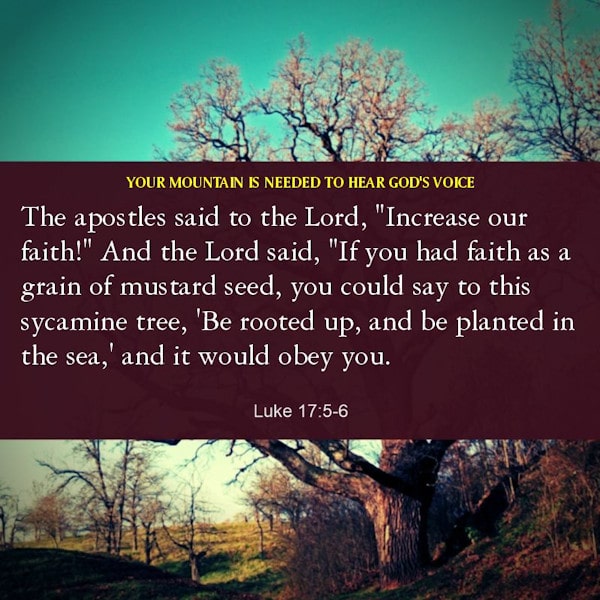
Here Jesus uses the illustration of a tree, because to move a tree it is necessary to deal with the roots that have been there for a long time.
Smith Wigglesworth said in his book ALWAYS GROWING FAITH: "any man can be changed by faith, however much he is handcuffed". In Mark 11:23, we see that Jesus said that this kind of faith will work for "whoever" and that "whatever he says will be done"
In other words, it will work for anyone with anything!
Jesus said in Luke 17: 6 that the tree will obey you!
It is not up to God or anyone else to deal with the situation: YOUR MOUNTAIN WILL OBEY YOU!
THIS MOUNTAIN NEEDS TO HEAR YOUR VOICE!
Your voice is the address in the spirit dimension!
In my distress I called upon the LORD; to my God I cried for help. From his temple he heard my voice, and my cry to him reached his ears. Then the earth reeled and rocked; the foundations also of the mountains trembled and quaked, because he was angry Psalm 18:6-7.
YOUR VOICE IS THE ROAD ON WHICH ANGELS TRAVEL.
If there's a mountain in your path, use the word to move it. God bless you!
Luke 17:19

This story is in Luke 17:12-19 - The healing of the ten lepers.
Jesus was going to Jerusalem and passing through a certain village met Him ten lepers who cried out, "Jesus, Master, have mercy on us!" And when he saw them, he said to them: "Go and show yourselves to the priest". And it came to pass that as they went, they were clean. The instruction to go to the priest was in accordance with the Levitical law concerning leprosy.
And one of them... came back glorifying God. This man was fully aware of the miracle he had been given, and he was deeply grateful for the healing. He expresses his gratitude with great emotion and aloud. AND THIS WAS A SAMARITAN. This was not what a Jew would have expected from a Samaritan. THE LESSON HERE - Gratitude and kindness are the result of a person's character; these qualities are not linked to race or nationality.
WHERE ARE THE NINE? Was there no one who returned to give glory to God but this foreigner? (verses 17-18). We do not know clearly whether the nine were Jews. But we know that none of the nine returned to express their gratitude. Why were they unanimous in this failure? Why is there so little of the spirit of gratitude in the human heart?
YOUR FAITH HAS SAVED YOU - Did he receive anything different from others? All were clean. Even though this man received nothing from the Lord other than this commendation, we can be sure that he received a gift of incalculable value. But he also received an inward blessing and the aggrandizement of his soul. The commendation implies that this man had more faith, or a superior quality of faith, when compared to the other nine.
Luke 17:32
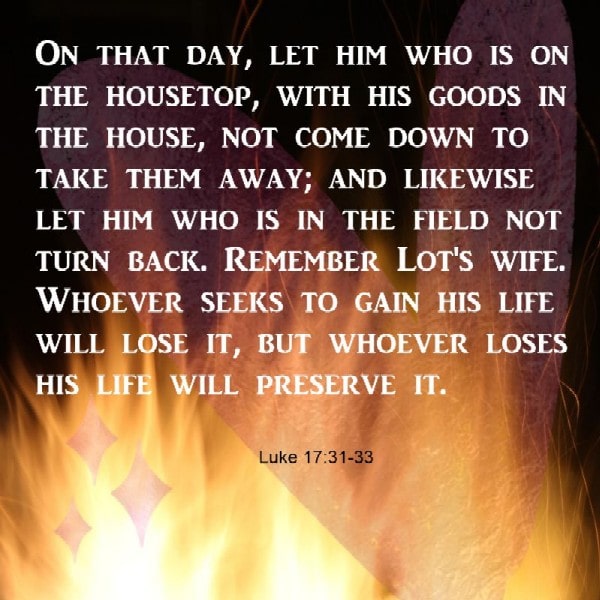
Jesus said, "No one can serve two masters; for either he will hate the one and love the other, or he will be devoted to the one and despise the other. You cannot serve God and money" (Matthew 6:24).
The point is that people must develop the right attitude towards God and the things of the world; to postpone this is foolish.
Lot's wife is an example. God sent angels to get them out of Sodom before destroying that city with fire and brimstone. The angels said that she should run away and not look back, but she did not listen; she disobeyed and lost her life when she was transformed into a salt statue. Apparently, she loved Sodom, did not want to leave the city, did not want to give up her material possessions and did not believe that God would destroy that abominable place.
Can you give up your car(s), your home and all your other possessions for Jesus? During the final days, whoever wants to keep everything, will lose; those who are willing to lose everything will win. The decision should not be difficult, and the person should not hesitate, but many will hesitate. Is that you? What would do?
We all know that we can die at any moment, but most people think they have plenty of time to prepare for it.
Luke 17:32

The tragic end of Lot's wife is an excellent illustration of what Jesus has just warned His disciples not to do. Lot and his family had a chance to escape Sodom before its destruction. The angel's command was, "“Flee for your life; do not look back or stop anywhere in the valley" (Gen 19:17). But Lot's wife disobeyed this order and looked back, evidently desiring to return, and was turned into a pillar of salt. She was taken out of Sodom, but Sodom was not taken out of her. Therefore, it became a perpetual warning that salvation is incomplete if the heart is not purified from love for the world.
Jesus told them a parable to show that they should ALWAYS PRAY AND NEVER BE DISCOURAGED: Luke 18:1
NOTHING HAPPENS ON EARTH WITHOUT MEN PRAYING, BECAUSE AUTHORITY OVER EARTH HAS BEEN GIVEN TO US AND FOR GOD TO MOVE, WE MUST MOVE.
Pray without ceasing (1 Thessalonians 5:17) - The Bible says that prayer is communion, it is relationship, and that is what God created man for.
OUR LIFE IS THE RESULT OF OUR PRAYERS and we need to intensify our communion with God.
All of our life is all of our ministry results from our prayer life!
Luke 18:7

Verse 8 has the answer: I say he will do them justice, and quickly!
This was a parable told by Jesus who insisted for justice to an unjust judgment and who did not care about people; until one day he decided to attend to this woman because her insistence was irritating him. If that could happen to this widow, how much more should a Christian have faith and believe that a just, good, and loving God will answer his prayers, even though He may delay—that is, even though the answer seems to delay! QUICKLY HE WILL DO JUSTICE, that is, suddenly, unexpectedly, but not necessarily when we think the answer must come.
Luke 18:24

The term difficult means "with difficulty," and this difficulty lies precisely in the fact that most men make their wealth their god.
Once again Jesus made use of hyperbole - An exaggerated statement to achieve the desired effect. The phrase IT IS EASIER FOR A CAMEL TO GO THROUGH THE EYE OF A NEEDLE must be accepted as written. The Jewish Talmud uses the figure of an elephant passing through the eye of a needle to express the idea of something impossible. Jesus did the same thing here.
The disciples were greatly astonished and asked, WHO CAN BE SAVED? This question reflects the common Jewish belief that material prosperity was evidence of God's blessings. While this belief is often reflected in the Old Testament, the book of Job refutes this idea.
As a way of answering, Jesus first looked at them - literally, "looked towards them". These penetrating glances of Christ undoubtedly had an effect on His words that would never be erased from the memory of those who understood their meaning. Then the Master declared that although this (the salvation of the rich) was impossible for men, there is no limit to what God can do when men allow Him to do His will.
- Note that Luke 19:10 says "what was lost" and not "those who were lost". In the previous verses, we see that Zacchaeus, the head of the tax collectors, in his house, had just received salvation. They were lost and had now been saved, but their salvation would not end there. The statement Jesus made about coming to save what was lost tells me that He intends to save us not only from our sins, but also from everything Satan tries to do to ruin our lives.
Luke 19:10
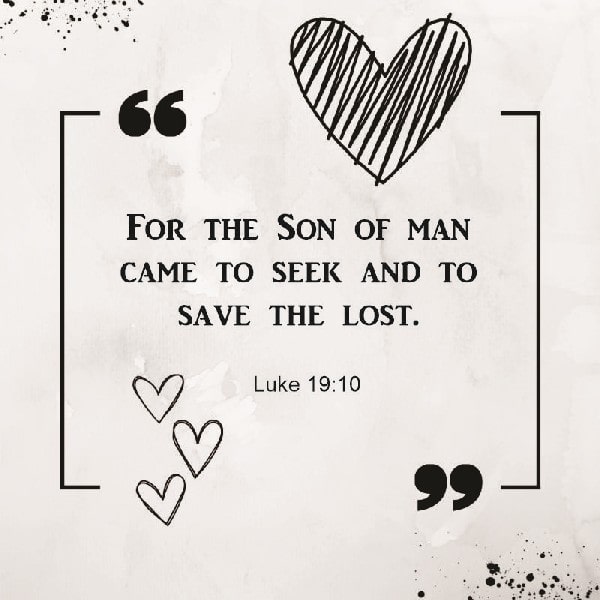
In chapter 19 of 1-10 Luke speaks of Zacchaeus' encounter with Jesus. The story is that when Jesus was passing through Jericho, a crowd followed him and Zacchaeus, out of curiosity, wanted to see him but he was of short stature and the crowd would not let him see. He climbed a tree so he could see Jesus better. And it was so successful that Jesus saw him and spoke to him and asked to visite his house. Zacchaeus repented of his sins and began to follow Jesus. He was the head of the tax collectors and therefore hated by the Jews.
And Jesus said to him, TODAY SALVATION HAS COME TO THIS HOUSE. A sinner in search of the Savior meets the Savior who is in search of the sinner. With true repentance, man found personal salvation. These gracious words of the Master were an assurance of Zacchaeus' salvation, a proclamation in his defense before the multitude, a promise to all men, in all places, and at all times, that Jesus Christ saves sinners.
So we have lessons:
- No one is so bad that he cannot be saved.
- How small and insignificant are the things that prevent the salvation of the soul!
- The sincere and willing compassion of Christ for sinners, and the power that Christ has to transform hearts.
- Converted sinners will always give evidence of their conversion.
Luke 19:26

- In its spiritual application, this means that those who make the Christian opportunity a form of spiritual blessing and growth will receive the divine bonus. Those who evade their faults through legalistic reflections on their obligations will lose both the bonus and the principal.
- This servant represents the man who allowed a spirit of resentment and bitterness to take the place of love and loyalty. He appointed himself the judge of his lord's methods; because he does not like the way his master does things, he gives up his job. He also represents the man who thinks that stewardship is all about not stealing the lord's money. His "goodness" is negative, not positive. He does not harm anyone (that is how he thinks), but he does not do any good either. In reality he is a thief, despite his illusion of self-righteousness; by being useless, he is robbing his lord of the gain he should have. When your lord returns, he will be an apostate and a confirmed cynic. In both his unjust criticism and his unfulfilled obligation, he represents the carnal Christian who complains and murmurs instead of producing.
- Let us stop pointing out just the flaws and flaws of the church or putting the blame on the pastor or anything. Our true Lord is returning and it is to Him that we will have to give an account, excuses will not help us or free our guilt.
Luke 19:38

When world leaders and other famous authorities come together, there is usually a lot of pomp and pageantry. Most people in Jesus' time expected a king to arrive in Jerusalem on a huge horse with a large retinue, surrounded by evidence of his military might and wealth. But Jesus entered the city on the back of a colt. Does God always work in your life the way you expect? Ask God to help you recognize him at work in your life, and enjoy his presence even when he works unexpectedly.
Luke 19:42 and 44
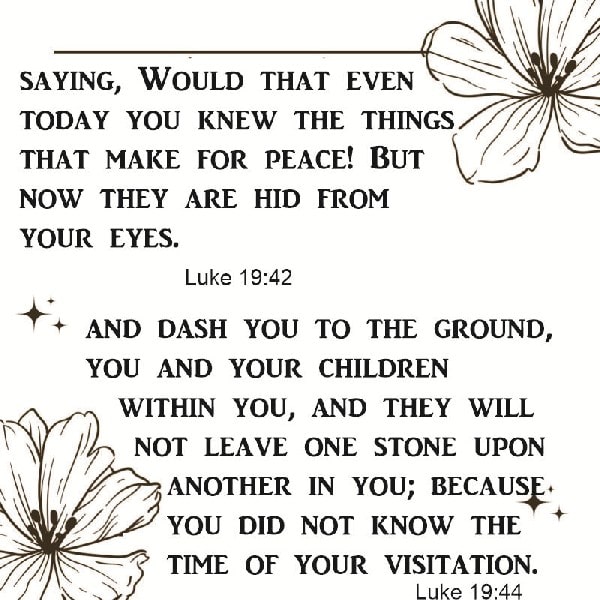
In Luke 19:41-44 Jesus is arriving in Jerusalem and when He sees the city He begins to cry. He saw the magnificent temple, the palaces and gardens of the wealthy Jews, and the great wall surrounding the city which formed a sight of beauty and splendor.
But all this brought Jesus only to tears. He saw something that others did not. He saw the future destruction of the city. He knew that all His efforts to reverse the tragedy had been rebuffed and rejected.
If they only knew, if they could learn now the conditions under which peace could be obtained! Those conditions were repentance and acceptance of Jesus as Lord and Savior. There was still a little time. But their case was hopeless, for SIN, PREJUDICE, REBELLION, AND PRESUMPTION hid from their eyes these basic conditions for peace.
And today, it remains the same. There are people who suffer hunger, suffer pain and will continue to do so or worse, because they continue to reject Jesus Christ, they want Jesus to conform to their standards or their ideologies and utopias. And Jesus continues to cry for knowing the eternal end for these people.
GIVE TO CAESAR … GIVE TO GOD
Jesus' answer astonished everyone. They had asked, "Should we pay the unfair fee?" Jesus answering said unto them, GIVE, as a just obligation, THEREFORE, TO CAESAR WHAT IS OF CAESAR. "The tax was not much and the coin had Caesar's effigy anyway - give it back to him!" Then, to show that there is no need for a conflict between a person's civil and religious duties, Jesus concluded: AND TO GOD, WHAT IS GOD'S (Perhaps Jesus was suggesting that if the Jewish nation had obeyed God's will, Caesar would not be in his land). "Duty to God and duty to the state are not incompatible; we have duties to both, and it is clearly possible to be a good Christian and a loyal citizen."
Romans 13:7 says: "Pay all of them their dues, taxes to whom taxes are due, revenue to whom revenue is due, respect to whom respect is due, honor to whom honor is due".
1 Peter 2:13-14 says: "Be subject for the Lord's sake to every human institution, whether it be to the emperor as supreme, 14or to governors as sent by him to punish those who do wrong and to praise those who do right".
- Other translations say: In your patience possess your soul. Patiently enduring persecution and pain and trusting in the power of an all-wise, loving, and all-powerful God is the way to victory.
- In this text Jesus makes us an alarming promise - AND YOU WILL BE HATED OF ALL.
- A Consoling Promise - A SINGLE HAIR OF YOUR HEAD WILL NOT PERISH.
- An encouraging guidance - IN THE PERSEVERANCE THAT YOU WILL OBTAIN LIFE.
- Let a man of God trouble any hidden feelings like ignorance, prejudice or evil - personal or social - and he will face the sinister and impassive face of hate. It is at this time that perseverance becomes a virtue and a duty. He who endures to the end, to the "last degree" will be saved.
- Persevere to preach the gospel and win souls.
Luke 21:28

The same unusual occurrences that will strike terror in the hearts of the unconverted persons. To true disciples of Christ, it will be signs that their final and eternal redemption is at hand. It is interesting to note how often Luke includes the Master's encouraging statements that the other evangelists omit.
AND TAKE HEED OF YOURSELVES, LESS YOUR HEART BE WEIGHED DOWN WITH DISSIPATION AND DRUNKENNESS… AND THAT DAY COME UPON YOU SUDDENLY LIKE A SNARE (verse 34). The Master ends his speech with a sharp and vivid warning to his disciples, so that never be careless, so that the day of the Lord should find them unprepared. Here is the definitive insinuation that the Lord's return cannot be dated. It can occur at any time.
Verse 35 - FOR IT WILL COME LIKE A CLAMP ON ALL THAT DWELL UPON THE FACE OF THE EARTH. The sudden coming of the Lord will be for those who are not prepared like the sudden closing of a trap on an animal that is not even suspected of it. On that day, there will be only two classes of people: those who are ready, to whom Christ's coming will be a supreme delight, and those who are not ready and to whom his return will be a blow of destruction.
Verse 36 - WATCH THEREFORE, PRAYING AT ALL TIMES, THAT YOU MAY BE CONSIDERED WORTHY TO AVOID ALL THESE THINGS… AND TO STAND BEFORE THE SON OF MAN. Unceasing prayer and vigilance are the keys to always being prepared. This requires our own efforts plus God's help, which is obtained through prayer. To stand means to be justified, to stand approved.
Luke 21:34-35
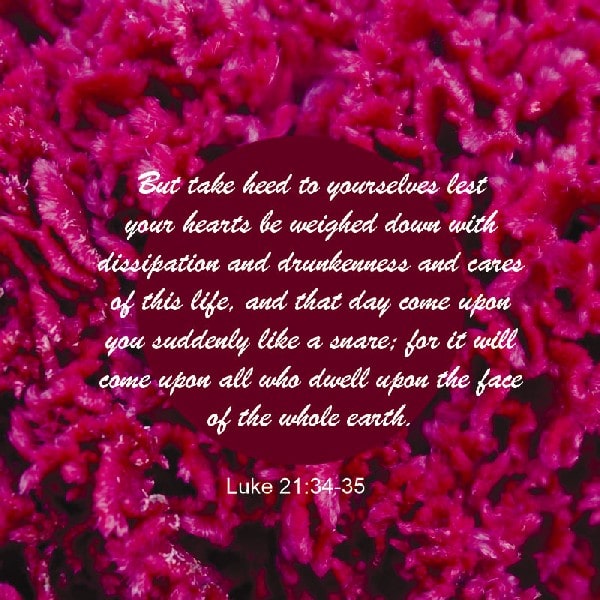
The master ended the discourse with a sharp and vivid warning to His disciples never to be careless so that the day of the Lord would find them unprepared. Here is the definitive hint that the Lord's return cannot be dated. It can occur at any time.
The sudden coming of the Lord will be for those who are not prepared like the sudden closing of a trap on an animal that did not even suspect it. On that day there will be only two classes of people: those who are ready, for whom Christ's coming will be a supreme pleasure, and those who are not ready and for whom his return will be like a blow of destruction.
Incessant prayer and vigilance are the keys to always being prepared.
This passage shows Satan's relationship to the crucifixion. Satan and not simply Judas and the chief priests - conspired to have Christ murdered. When he achieved his purpose, he thought without a doubt that he had dealt a death blow to the Kingdom of God on earth. But, on the contrary, it helped bring about its own undoing, for this "defeat" of Christ was the greatest victory of all time.
As a Christian, we must not act in the flesh, trying to satisfy our desires, however good we think they are, for all the good that in our head will be accomplished. God is wise and always has the best, even if it is beyond our understanding. But God's will will always be better.
Luke 22:27
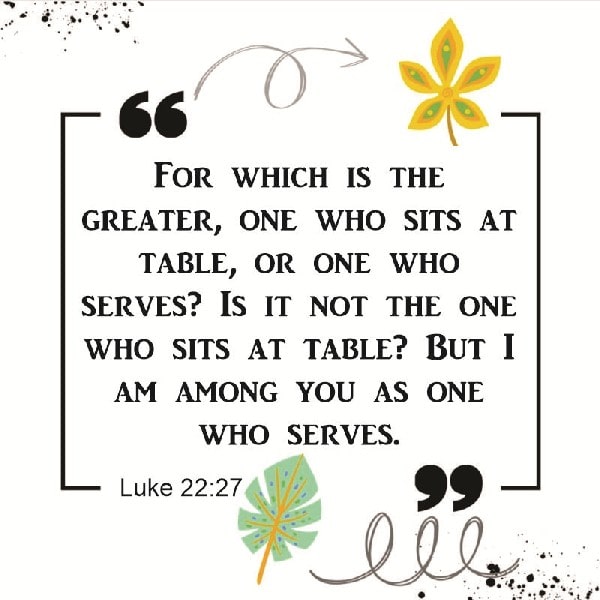
In Jesus' day the almost universal answer to this question would have been that the one sitting at the table would be the greatest. The servant was a mere slave. So Jesus answers his own question in terms of the prevailing concept of greatness: IS IT NOT WHO IS AT THE TABLE? It is almost as if He is agreeing with the popular notion, but it is against this hypothetical knowledge that He says: BUT I AM AMONG YOU AS HE WHO SERVES. Jesus is saying that service is an emblem of true greatness. He is also saying that even in a world where the opposite view prevails, where authority and position are signs of greatness, and where a servant is worth next to nothing, the Christian must follow the path of service. As each Christian follows this path, he sees the divine footprints that show that the Master passed there before him.
Luke 22:31

- Verse 32 - But I have prayed for you that your faith may not fail; and when you have turned again, strengthen your brethren.
- This is reminiscent of Satan's efforts to get Job through his "sieving" process. The sequel, however, shows that he had more success with Peter than with Job, although this success was only temporary. Perhaps Satan was excited by his success in turning Judas away from the Master.
- Satan wants to sift all of God's children, and he will do everything he can to prove that they are not worthy of the Master. It is necessary to be in constant prayer to get rid of the "evil one".
- The figure of sifting like wheat is a metaphor that would be easily understood by Jesus' listeners. Sieving or sifting is intended to remove the chaff or wheat residues. Satan sifts through the temptation he uses in order to separate us from the Lord's wheat.
- BUT I PRAYED FOR YOU, THAT YOUR FAITH MAY NOT FAIL - prayers are answered as our faith is strengthened. Christ is not a neutral spectator of combat. We have his intercession and also heavenly assistance.
God bless and guard us
Luke 22:48

The case of Judas makes us think seriously how a man whom Christ chose to be an apostle and sent to preach could end his career in this way.
When Judas saw that Jesus had been condemned by the Sanhedrin - and this verdict was irrevocable - he REPENTED. But the verb used is not metanoeo, "to change your mind", but metamelomai, "to regret". He regretted the consequences of his act of betrayal, but he had no genuine repentance for his sin. Returning to the presence of the chief priests and elders (the Sanhedrin), he took the thirty pieces of silver. The money burned in his hands.
To the religious leaders, he makes this confession: I HAVE SINNED IN BETRAYING INNOCENT BLOOD. But he received neither comfort nor help from them, who, in response, only said to him: WHAT IS THAT TO US? SEE TO IT YOURSELF. If spiritual leaders spoke this way to their people, it was quite clear that things were very wrong with Judaism.
Judas could no longer bear the sight of his ill-gotten gain. Literally "throwing down the silver coins into the temple" - he withdrew and went to hang himself.
Beloved, pray to God before making choices, do not just follow your heart, our hearts are corrupt and deceitful. Do not make a decision just for what you "think" is right. Do not make a decision for immediate gain, but for long-term harm. Do not make a decision based on passion, passion blinds us! Finally, let us not be like Judas… he thought that Jesus would not be murdered… when he realized the size of the evil… it was too late, it will come". Be very careful in today's choices, because tomorrow you could literally be thrown down the street of bitterness.
This prayer, which is the first of the seven statements made by Jesus on the cross, appears to have been addressed to the soldiers, and was probably uttered while they were nailing Him to the cross. The expression (they) DO NOT KNOW WHAT THEY DO could hardly apply to those Jews who had planned His death, nor could it fully apply to Pilate, though Jesus wished no harm to either the Jews or Pilate.
Even today this phrase is used a lot and gives the person an innocence that sometimes they do not have. Sometimes people choose what is wrong on a thoughtful basis. It is even taking a risk of suffering in the future because of that choice. Let us pray that we may know how to do the will of God.
That is, something "closed" their eyes, so that they could not recognize him.
One thing that did not allow these disciples to recognize Jesus was the fact that, as expressed by Mark, He manifested Himself in another form (Mark 16:12). Somehow, his personal appearance was changed. Mary Magdalene had seen the risen Lord, without recognizing him, although she had found him in the vicinity of his tomb (John 20:15). Jesus' disguise was most effective here because of the disciples' unbelief regarding the resurrection, and also because of His sudden appearance on the road to Emmaus.
And being at table, taking the bread, He blessed it and broke it and gave it to him. THEN THEIR EYES WERE OPENED, AND THEY RECOGNIZED HIM. No wonder their eyes were opened; No wonder they met! Let us pray that God will keep our eyes and understanding open to know when Christ is speaking.


